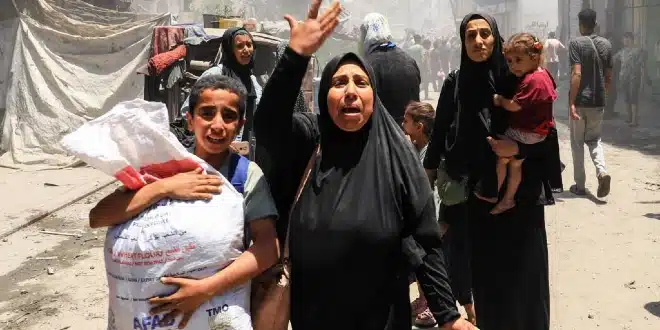The humanitarian situation in Gaza has reached alarming levels, with the United Nations warning on Tuesday that the region is teetering on the edge of full-scale famine. The death toll from Israel’s military campaign has surpassed 60,000, according to the health ministry in Gaza, which is governed by Hamas.
Dire Food Insecurity and a Race Against Time
A joint alert from the World Food Program (WFP), UNICEF, and the Food and Agriculture Organization painted a grim picture of the current conditions. The agencies warned that Gaza is “on the brink of a full-scale famine” and called for an immediate and uninterrupted flow of food into the territory. “We need to flood Gaza with large-scale food aid, immediately and without obstruction, and keep it flowing each and every day to prevent mass starvation,” emphasized WFP Executive Director Cindy McCain.
The Integrated Food Security Phase Classification Initiative (IPC), an organization that monitors global hunger threats, confirmed that the worst-case famine scenario is starting to materialize in Gaza. Although the IPC has not officially declared a famine, its latest findings underscore the urgency of the crisis.
Temporary Pauses and Limited Aid Corridors
In response to growing international pressure, Israel began implementing daily tactical pauses in military activity across certain populated zones of Gaza. These pauses are aimed at facilitating aid deliveries via designated humanitarian routes between 6:00 a.m. and 11:00 p.m., with ceasefire periods from 10:00 a.m. to 8:00 p.m., according to the Israeli government.
On Monday alone, over 200 aid trucks entered the enclave, while another 260 reached collection points. Additionally, Jordan and the UAE have coordinated airdrops of aid supplies, and U.N. tankers have delivered fuel to support humanitarian operations.
However, these efforts have not been enough. The IPC insists that unless aid workers receive full and unimpeded access to deliver life-saving assistance, widespread death from starvation will follow. They reported that at least 16 children under five have died from hunger-related causes since mid-July.
Ongoing Airstrikes and Mounting Civilian Casualties
Despite the declared pauses in fighting, Israeli airstrikes have continued in some areas. On Tuesday, Gaza’s civil defense service reported that 30 Palestinians were killed in strikes on the Nuseirat refugee camp, including women and children. The Israeli military confirmed targeting “terror infrastructure” in the area but questioned the reported casualty figures.
The Gaza health ministry announced that more than 60,000 Palestinians—mostly civilians—have died since the beginning of the conflict, which erupted in October 2023 after a surprise attack by Hamas on Israeli soil killed 1,219 people, primarily civilians.
Growing International Pressure on Israel
As the humanitarian crisis deepens, Western leaders are stepping up diplomatic efforts. Germany’s Chancellor Friedrich Merz said that the foreign ministers of Germany, France, and Britain may visit Israel soon to push for urgent action.
British Prime Minister Keir Starmer declared his government’s readiness to recognize a Palestinian state as a strategic move to revive the two-state solution. “With that solution now under threat, this is the moment to act,” he stated.
Meanwhile, Israel continues to reject any linkage between humanitarian aid and the political future of the region. The Prime Minister’s office accused Hamas of manipulating aid distribution and casualty reports to stoke international outrage. “Hamas benefits from attempting to fuel the perception of a humanitarian crisis,” the statement claimed, adding that Hamas allegedly diverts aid and intimidates civilians.
Ceasefire Standoff and Political Impasse
The broader diplomatic impasse remains unresolved. Israel’s full blockade, imposed in early March after ceasefire negotiations collapsed, has contributed to Gaza’s isolation and deteriorating conditions. Though limited aid resumed in late May, experts and aid agencies agree that far more needs to be done to avert catastrophe.
Adding to the tension, Hamas-aligned Lebanese Speaker Nabih Berri reportedly asked the U.S. to pressure Israel to halt airstrikes before any agreement to disarm Hezbollah—a request that Israel dismissed.
As Gaza’s humanitarian emergency spirals, the world watches with mounting concern, and the calls for a long-term ceasefire and political resolution grow louder by the day. Without decisive action, the already staggering human cost is poised to rise even further.


